ACRE
BBC on set with show’s director
PUBLICADO
1 ano atrásem
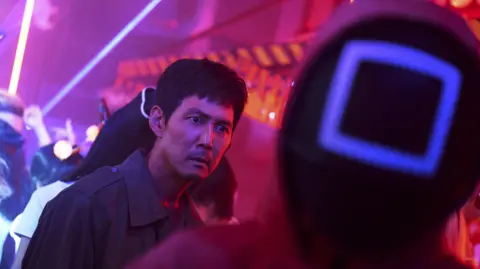 Netflix
NetflixWhen I ask the creator of the hit Korean drama Squid Game about reports that he was so stressed while shooting the first series he lost six teeth, he quickly corrects me. “It was eight or nine,” he laughs.
Hwang Dong-hyuk is speaking to me on set as he films the second series of his dystopian Netflix thriller, which sees hundreds of debt-laden contestants fight it out for a whopping cash prize, by playing a string of life-or-death children’s games.
But another series was not always on the cards. At one point, he swore against making one.
Given the stress it has caused him, I ask what changed his mind.
“Money,” he answers, without hesitation.
“Even though the first series was such a huge global success, honestly I didn’t make much,” he tells me. “So doing the second series will help compensate me for the success of the first one too.”
“And I didn’t fully finish the story,” he adds.
The first series was Netflix’s most successful show to date, thrusting South Korea and its home-grown television dramas into the spotlight. Its dark commentary on wealth inequality touched a nerve with audiences around the globe.
But having killed off almost every character, Hwang has had to start from scratch, with a new cast and set of games, and this time audience expectations are sky high.
“The stress I feel now is much greater,” he says.
Three years after the first series aired, Hwang is even more pessimistic about the state of the world.
He points to current wars, climate change and a widening global wealth gap. Conflicts are no longer confined between the rich and poor, they are playing out intensely between different generations, genders and political camps, he says.
“New lines are being drawn. We’re in an era of us vs them. Who’s right and who’s wrong?”

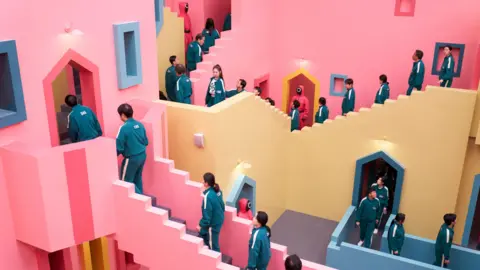 Netflix
NetflixAs I toured the show’s playful set, with its distinctive brightly-coloured staircase, I picked up a few clues as to how the director’s despair will be reflected this time around.
In this series, the previous winner, Gi-hun, re-enters the game on a quest to bring it down and save the latest round of contestants.
According to Lee Jung-jae, who plays the leading character, he is “more desperate and determined” than before.
The floor of the dormitory, where the contestants sleep at night, has been divided in two.
One half is branded with a giant red neon X symbol, the other with a blue circle.
Now, after every game, the players must pick a side, depending on whether they want to end the contest early and survive, or keep playing, in the knowledge all but one of them will die. The majority decision rules.
This, I am told, will lead to more factionalism and fights.
It is part of director Hwang’s plan to expose the dangers of living in an increasingly tribal world. Forcing people to pick sides, he believes, is fuelling conflict.
For all those who were captivated by the shocking storytelling of Squid Game, there were others who found it gratuitously violent and difficult to watch.
But it is clear from talking to Hwang, that the violence is fully thought out. He is a man who thinks and cares deeply about the world and is motivated by a mounting unease.
“When making this series, I constantly asked myself ‘do we humans have what it takes to steer the world off this downhill path?’. Honestly, I don’t know,” he says.
While viewers of the second series might not get the answers to these big life questions, they can at least be comforted that some plot holes will be filled in – like why the game exists, and what is motivating the masked Front Man running it.
“People will see more of the Front Man’s past, his story and his emotions,” reveals the actor Lee Byung-hun, who plays the mysterious role.
“I don’t think this will make viewers warm to him, but it may help them better understand his choices.”

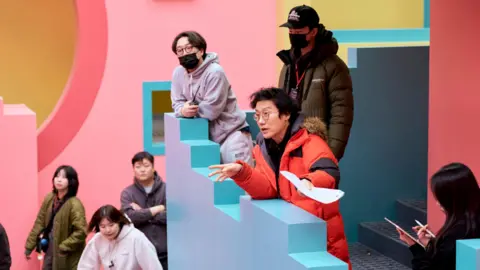 Netflix
NetflixAs one of South Korea’s most famous actors, Lee admits that having his face and eyes covered and his voice distorted throughout the first series, was “a little bit dissatisfying”.
This series he has relished having scenes without a mask, in which he can fully express himself – a chance he nearly did not get.
Hwang tried for 10 years to get Squid Game made, taking out large loans to support his family, before Netflix swooped in.
They paid him a modest upfront amount, leaving him unable to cash in on the whopping £650m it is estimated to have made the platform.
This explains the love-hate relationship South Korea’s film and television creators currently have with international streaming platforms.
Over the past few years, Netflix has stormed the Korean market with billions of dollars of investment, bringing the industry global recognition and love, but leaving creators feeling short-changed.
They accuse the platform of forcing them to relinquish their copyright when they sign contracts – and with it, their claim to profit.
This is a worldwide problem.
In the past, creators could rely on getting a cut of box office sales or TV re-runs, but this model has not been adopted by streaming giants.
The issue is compounded in South Korea, creators say, due to its outdated copyright law, which does not protect them.
This summer, actors, writers, directors and producers teamed up to form a collective, to fight the system together.
“In Korea, being a movie director is just a job title, it’s not a way to earn a living,” the vice-president of the Korean Film Directors Guild, Oh Ki-hwan, tells the audience at an event in Seoul.
Some of his director friends, he says, work part-time in warehouses and as taxi drivers.

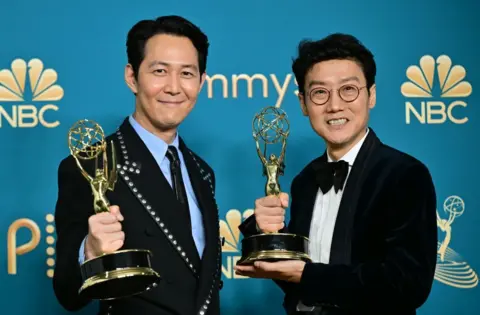 Getty Images
Getty ImagesPark Hae-young is a writer at the event. When Netflix bought her show, ‘My Liberation Notes’, it became a global hit.
“I’ve been writing my whole life. So, to get global recognition when competing with creators from across the world, has been a joyful experience,” she tells me.
But Park says the current streaming model has left her reluctant to “pour her all” into her next series.
“Usually, I’ll spend four or five years making a drama in the belief that, if it’s successful, it could somewhat secure my future, that I’ll get my fair share of compensation. Without that, what’s the point of working so hard?”
She and other creators are pushing the South Korean government to change its copyright law to force production companies to share their profits.
In a statement, the South Korean government told the BBC that while it recognised the compensation system needed to change, it was up to the industry to resolve the issue. A spokesperson for Netflix told us it offers “competitive” compensation, and guarantees creators “solid compensation, regardless of the success or failure of their shows”.
Squid Game’s Hwang hopes his candor over his own pay struggles will initiate that change.
He has certainly sparked the fair pay conversation, and this second series will surely give the industry another bump.
But when we catch up after filming has wrapped, he tells me his teeth are aching again.
“I haven’t seen my dentist yet, but I’ll probably have to pull out a few more very soon.”
The second series of Squid Game will be released on Netflix on 26 December 2024.
Relacionado
ACRE
Ufac realiza formatura de alunos do CAp pela 1ª vez no campus-sede — Universidade Federal do Acre
PUBLICADO
1 dia atrásem
30 de janeiro de 2026A Ufac realizou a cerimônia de certificação dos estudantes concluintes do ensino médio do Colégio de Aplicação (CAp), referente ao ano letivo de 2025. Pela primeira vez, a solenidade ocorreu no campus-sede, na noite dessa quinta-feira, 29, no Teatro Universitário, e marcou o encerramento de uma etapa da formação educacional de jovens que agora seguem rumo a novos desafios acadêmicos e profissionais.
A entrada da turma Nexus, formada pelos concluintes do 3º ano, foi acompanhada pela reitora Guida Aquino; pelo diretor do CAp, Cleilton França dos Santos; pela vice-diretora e patronesse da turma, Alessandra Lima Peres de Oliveira; pelo paraninfo, Gilberto Francisco Alves de Melo; pelos homenageados: professores Floripes Silva Rebouças e Dionatas Ulises de Oliveira Meneguetti; além da inspetora homenageada Suzana dos Santos Cabral.
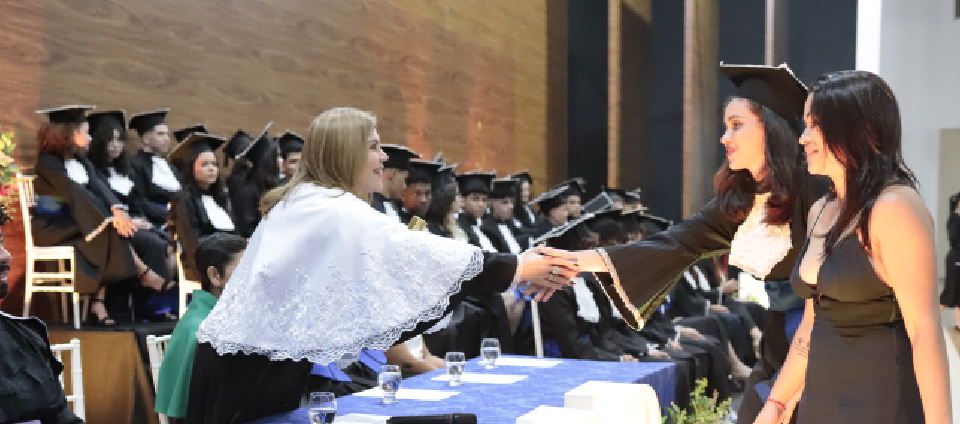
Guida destacou a importância do momento para os estudantes, suas famílias e toda a comunidade escolar. Ela parabenizou os formandos pela conquista e reconheceu o papel essencial dos professores, da equipe pedagógica e dos familiares ao longo da caminhada. “Tenho certeza de que esses jovens seguem preparados para os próximos desafios, levando consigo os valores da educação pública, do conhecimento e da cidadania. Que este seja apenas o início de uma trajetória repleta de conquistas. A Ufac continua de portas abertas e aguarda vocês.”
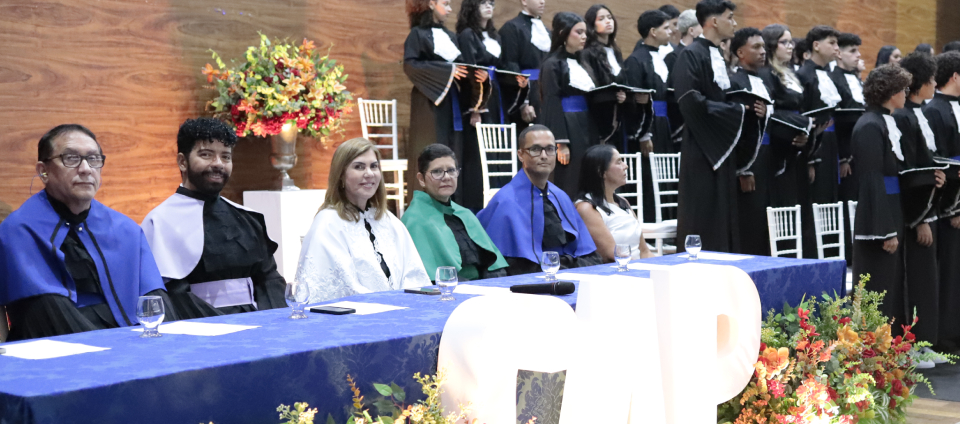
Durante o ato simbólico da colocação do capelo, os concluintes reafirmaram os valores que orientaram sua trajetória escolar. Em nome da turma, a estudante Isabelly Bevilaqua Rodrigues fez o discurso de oradora.
A cerimônia seguiu com a entrega dos diplomas e as homenagens aos professores e profissionais da escola indicados pelos concluintes, encerrando a noite com o registro da foto oficial da turma.
Relacionado
ACRE
Especialização em Enfermagem Obstétrica tem aula inaugural — Universidade Federal do Acre
PUBLICADO
4 dias atrásem
27 de janeiro de 2026O curso de especialização em Enfermagem Obstétrica teve sua aula inaugural nesta terça-feira, 27, na sala Pedro Martinello do Centro de Convenções, campus-sede da Ufac. O curso é promovido pela Universidade Federal de Minas Gerais, com financiamento do Ministério da Saúde, no âmbito da Rede Alyne; a Ufac é um dos 39 polos que sedia essa formação em nível nacional.
A especialização é presencial, com duração de 16 meses e carga horária de 720 horas; tem como objetivo a formação e qualificação de 21 enfermeiros que já atuam no cuidado à saúde da mulher, preparando-os para a atuação como enfermeiros obstetras. A maior parte dos profissionais participantes é oriunda do interior do Estado do Acre, com predominância da regional do Juruá.
“Isso representa um avanço estratégico para o fortalecimento da atenção obstétrica qualificada nas regiões mais afastadas da capital”, disse a coordenadora local do curso, professora Sheley Lima, que também ressaltou a relevância institucional e social da ação, que está alinhada às políticas nacionais de fortalecimento da atenção à saúde da mulher e de redução da morbimortalidade materna.
A aula inaugural foi ministrada pela professora Ruth Silva Lima da Costa, com o tema “Gravidez na Adolescência e Near Miss Neonatal na Região Norte: Dados da Pesquisa Nascer no Brasil 2”. Ela é doutora em Ciências da Saúde pela Fiocruz, enfermeira da Ufac e docente da Uninorte.
Relacionado
ACRE
Calendário 2026 do Acre: Veja o calendário do Governo e Judiciário que vai ditar o ritmo do ano
PUBLICADO
2 semanas atrásem
20 de janeiro de 2026Clique aqui para baixar o calendário estadual completo: Decreto 11.809, Calendário 2026 Acre, ed. 14.173-B, de 22.12.2025
Há quem organize a vida por metas, há quem organize por boletos… e existe um grupo que planeja o ano inteiro por uma régua silenciosa, porém poderosa: o calendário oficial. Desde início de janeiro, essa régua ganhou forma no Acre com dois instrumentos que, na prática, definem como o Estado vai pulsar em 2026 — entre atendimentos, plantões, prazos, audiências e aquele respiro estratégico entre uma data e outra.
De um lado, o Governo do Estado publicou o Decreto nº 11.809, de 22 de dezembro de 2025, fixando feriados e pontos facultativos de 2026 para os órgãos do Poder Executivo, do dia 1º de janeiro ao último dia do ano, com a ressalva de que serviços essenciais não podem parar.
Do outro, o Tribunal de Justiça do Acre respondeu com a sua própria cartografia do tempo: a Portaria nº 6569/2025, que institui o calendário do Poder Judiciário acreano para 2026, preservando o funcionamento em regime de plantão sempre que não houver expediente. O texto aparece no DJe (edição nº 7.925) e também em versão integral, como documento administrativo autônomo.
Clique aqui para baixar o calendário forense completo: DJE – Portaria 6.5692025, edição 7.925, 22.12.2025
O “mapa do descanso” tem regras — e tem exceções
No calendário do Executivo, as datas nacionais aparecem como pilares já conhecidos (como Confraternização Universal, Tiradentes, Dia do Trabalho, Independência, Natal), mas o decreto também reforça a identidade local com feriados estaduais e pontos facultativos típicos do Acre.
Chamam atenção duas engrenagens que costumam passar despercebidas fora da rotina pública:
- ponto facultativo não é sinônimo de folga garantida — a chefia pode convocar para expediente normal por necessidade do serviço;
- quando o servidor é convocado nesses dias, o decreto prevê dispensa de compensação para quem cumprir horário no ponto facultativo.
No Judiciário, a lógica é parecida no objetivo (manter o Estado funcionando), mas diferente na mecânica. A Portaria do TJAC prevê expressamente que, havendo necessidade, pode haver convocação em regime de plantão, respeitando-se o direito à compensação de horas, conforme regramento administrativo interno.
Quando o município faz aniversário, a Justiça muda o passo
O “calendário do fórum” também conversa com o mapa das cidades. A Portaria prevê que, em feriado municipal por aniversário do município, não haverá expediente normal nas comarcas correspondentes — apenas plantão. E, quando o município declara ponto facultativo local, a regra traz até prazo de comunicação no interior: pelo menos 72 horas de antecedência para informar se haverá adesão.
É o tipo de detalhe que não vira manchete — mas vira realidade para quem depende de balcão, distribuição, atendimento e rotina de cartório.
Um ano que já começa “com cara de planejamento”
Logo na largada, o Executivo lista 1º de janeiro como feriado nacional e já prevê, para 2 de janeiro, ponto facultativo (por decreto específico citado no anexo). Também aparecem o Carnaval e a Quarta-feira de Cinzas como pontos facultativos, desenhando, desde cedo, o recorte de semanas que tendem a ser mais curtas e mais estratégicas.
No Judiciário, a Portaria organiza o mesmo período com olhar forense — e, além de datas comuns ao calendário civil, agrega as rotinas próprias do Poder Judiciário, preservando a prestação jurisdicional via plantões e regras de compensação.
Rio Branco também entra no compasso de 2026
Para além do calendário estadual e do Judiciário, a capital também oficializou seu próprio “mapa do tempo”: o Prefeito de Rio Branco editou o Decreto Municipal nº 3.452, de 30/12/2025, estabelecendo os feriados e pontos facultativos de 2026 para os órgãos e entidades do Poder Executivo Municipal, com referência expressa ao calendário do Estado.
Na prática, a cidade reforça o mesmo recado institucional: serviços essenciais não param, funcionando por escala ou plantão, e os gestores ficam autorizados a convocar servidores em dias de ponto facultativo, sem exigência de compensação para quem cumprir expediente. No anexo, aparecem datas que impactam diretamente a rotina da população, como o Carnaval (16 a 18/02, ponto facultativo), o Dia do Servidor Público (28/10, ponto facultativo) e o Aniversário de Rio Branco (28/12, feriado municipal) — fechando o ano com a véspera de Ano Novo (31/12, ponto facultativo).
Clique aqui para baixar o calendário municipal completo: DOE, edição 3.452, de 30.12.2025 – Calendário Prefeitura de Rio Branco-AC
Por que isso importa
O calendário oficial é mais do que uma lista de “dias marcados”: ele é o roteiro do funcionamento do Estado. Para o cidadão, significa previsibilidade; para advogados e jurisdicionados, significa atenção ao modo como cada órgão funcionará em datas críticas; para gestores, significa logística e escala; e para o próprio Acre, significa um desenho institucional que equilibra tradição, trabalho e continuidade.
Skip to PDF contentRelacionado
PESQUISE AQUI
MAIS LIDAS

 Economia e Negócios5 dias ago
Economia e Negócios5 dias agoRompendo o molde com primeiros princípios, o Grupo GWM lança a plataforma “GWM ONE”, definindo uma nova era para veículos com todas as motorizações

 Economia e Negócios3 dias ago
Economia e Negócios3 dias agoO Papel Estratégico do Software de Data Room Virtual em Transações de Alto Nível

 ACRE4 dias ago
ACRE4 dias agoEspecialização em Enfermagem Obstétrica tem aula inaugural — Universidade Federal do Acre

 OPINIÃO2 dias ago
OPINIÃO2 dias agoArtigo de Opinião: Flávio Bolsonaro – um herdeiro sem projeto para o Brasil
Warning: Undefined variable $user_ID in /home/u824415267/domains/acre.com.br/public_html/wp-content/themes/zox-news/comments.php on line 48
You must be logged in to post a comment Login